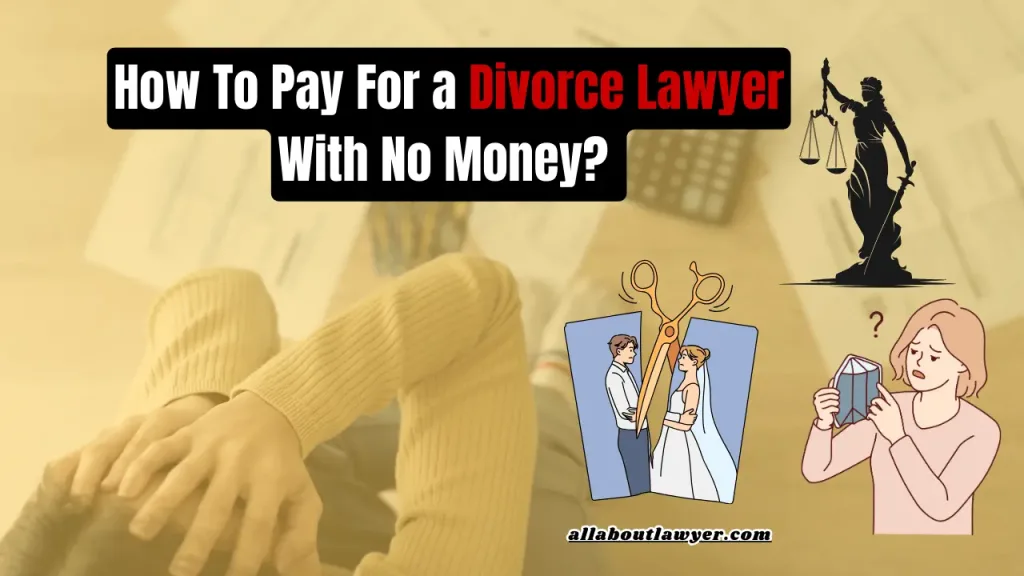How To Pay For a Divorce Lawyer With No Money?
Going through a divorce can be an emotionally and financially draining experience. Hiring a divorce lawyer may seem like a luxury you can’t afford, especially when financial resources are limited. However, not having legal representation during such a critical time can put you at a significant disadvantage. Fortunately, there are ways to secure a divorce lawyer, even when funds are tight. This guide provides detailed strategies for finding affordable or free legal help, managing legal costs, and exploring alternative funding methods, so you can protect your rights without breaking the bank.
Table of Contents
Why You Need a Divorce Lawyer
Before exploring how to pay for a divorce lawyer with no money, it’s important to understand why having legal representation is crucial during divorce proceedings. A skilled divorce lawyer can:
- Protect Your Rights: Ensure your rights are safeguarded, whether related to child custody, alimony, or property division.
- Handle Complex Legal Processes: Divorce laws vary by state and can be intricate, requiring expert knowledge to handle effectively.
- Offer Objective Advice: A lawyer provides rational advice, helping you make informed decisions during emotionally charged situations.
- Manage Paperwork: Divorce involves extensive paperwork, and a lawyer ensures that everything is properly filed and completed on time.
- Negotiate Fair Settlements: A divorce lawyer is a skilled negotiator who can advocate for your interests and work toward a fair settlement.

Free and Low-Cost Legal Help For Divorce Lawyer With No Money
If your financial situation is tight, several resources are available to help you find a divorce lawyer at no or low cost.
1. Pro Bono Legal Services
Many lawyers provide pro bono (free) services to individuals who cannot afford legal fees. You can find pro bono services by:
- Contacting your local bar association, which can refer you to attorneys offering free services.
- Reaching out to legal aid societies, which often match low-income clients with pro bono lawyers.
- Inquiring with law schools that operate legal clinics, where law students, supervised by licensed attorneys, provide free services.
2. Legal Aid Societies
Legal aid societies are non-profit organizations offering free legal services to individuals who meet specific income qualifications. These organizations often assist with family law cases, including divorce.
- How to Qualify: You’ll need to provide proof of income to show that you meet their eligibility criteria.
- How to Apply: Contact your local legal aid office to apply for assistance.
3. Court-Appointed Attorneys
In certain situations, courts may appoint an attorney to represent individuals who cannot afford one. Although this is more common in criminal cases, some family law cases may also qualify for court-appointed counsel, especially when complex legal issues are at stake or fairness is a concern.
4. Law School Clinics
Many law schools have legal clinics where students, under the supervision of experienced lawyers, provide free legal services. This option can be a great way to receive competent legal help at no cost while helping future attorneys gain valuable experience.
5. Non-Profit Organizations
Some non-profit organizations focus specifically on helping individuals with family law matters. These groups may offer free or sliding-scale legal services for divorce cases.
Affordable Legal Representation Options For Divorce Lawyer With No Money
If you don’t qualify for free services, you can still find ways to reduce the cost of legal representation. Here are a few budget-friendly alternatives:
1. Sliding Scale Fees
Some lawyers offer sliding scale fees based on your financial situation. This means the fee is adjusted according to your income level. To take advantage of this:
- Be upfront about your financial situation when contacting lawyers.
- Ask specifically if they offer sliding scale fee options.
- Provide documentation that verifies your income for accurate pricing.
2. Limited Scope Representation (Unbundled Services)
Limited scope representation, also known as “unbundled legal services,” allows you to hire a lawyer for specific tasks rather than full representation throughout your case. This option can significantly reduce costs, as you only pay for the help you need.
- How it Works: You might hire a lawyer to handle negotiations or review documents while managing simpler tasks yourself.
3. Flat-Rate Divorce Lawyers
Some attorneys offer flat-rate fees for uncontested divorces, where both parties agree on all terms, including child custody, property division, and alimony. Flat-rate billing can help you control costs since you know the exact amount upfront.
- What’s Included: Be sure to ask what services are covered in the flat rate and whether there are any additional fees for unforeseen circumstances.
4. Payment Plans
Many attorneys are willing to offer payment plans to clients who cannot afford to pay the entire legal fee upfront. When discussing payment options, be honest about your financial limitations and propose a reasonable payment schedule.
Alternative Funding Sources For Divorce Lawyer With No Money
When free or affordable legal services aren’t available, you may need to explore other methods of funding your legal fees.
1. Personal Loans
Taking out a personal loan can help cover the costs of a divorce lawyer. Shop around for the best interest rates and terms, and ensure you have a realistic plan for repaying the loan.
- Consider: Online lenders, credit unions, and banks for loan options.
2. Credit Cards
While credit cards often come with high-interest rates, they can provide immediate access to funds for legal fees. If you go this route, be cautious and make sure to pay off the balance as quickly as possible to avoid accumulating interest.
3. Crowdfunding
Crowdfunding platforms like GoFundMe allow you to raise money for personal causes, including legal fees. When setting up a crowdfunding campaign, be transparent about your situation and share it widely to increase donations.
4. Borrowing from Family or Friends
If you have a trusted network of family or friends, borrowing money might be an option. Be clear about repayment terms and consider drafting a written agreement to avoid misunderstandings.
5. Liquidating Assets
Selling personal assets, such as jewelry, electronics, or even investments, can provide immediate funds for legal fees. Just ensure you understand the tax implications of liquidating certain assets, particularly investments.

Cost-Saving Strategies for Divorce Lawyer With No Money
In addition to finding affordable legal services, you can employ strategies to reduce the overall cost of your divorce:
1. Opt for an Uncontested Divorce
An uncontested divorce is where both parties agree on key issues such as child custody, alimony, and property division. This can save you a significant amount of money in legal fees as it avoids lengthy court battles.
2. Consider Mediation
Mediation involves a neutral third party helping both spouses negotiate the terms of the divorce. Mediation is often far less expensive than litigation and can help resolve disputes amicably.
3. Be Organized
Gather and organize all necessary financial documents, including tax returns, bank statements, and records of assets and debts. By having this information ready, you can save your lawyer time, which in turn reduces your legal fees.
4. Limit Communication Costs
Be efficient in how you communicate with your lawyer. Instead of calling for every question, consolidate them into one email or meeting to reduce billable hours.
5. Explore Online Divorce Services
If your divorce is uncontested and straightforward, online divorce services can be a cost-effective option. These services provide all the necessary paperwork and instructions for filing.
Additional Support During Divorce Lawyer With No Money
Going through a divorce can be emotionally overwhelming. Don’t hesitate to seek additional support:
- Financial Counseling: Many non-profit organizations offer free or low-cost financial counseling to help you manage your finances during and after divorce.
- Support Groups: Divorce support groups, either in person or online, provide emotional support and practical advice from others going through similar situations.
- Community Resources: Local community centers, religious organizations, and social services agencies often provide counseling and legal referral services.
Conclusion
While paying for a divorce lawyer with no money may seem daunting, it’s not impossible. By exploring free legal services, affordable representation options, and alternative funding sources, you can secure the legal help you need to protect your rights. Don’t let financial constraints prevent you from getting the proper representation during your divorce. With careful planning, resourcefulness, and the support of community organizations, you can successfully handle your divorce while minimizing legal costs.
Related Articles For You:
California Divorce Law 5 Year Rule Legal Process
Essential Questions to Ask Your Lawyer
Can My Spouse Make Me Pay Her Divorce Attorney Fees?
FAQs
Can I get a divorce without a lawyer if I can’t afford one?
Yes, it’s possible to get a divorce without a lawyer, especially if it’s uncontested. However, it’s generally recommended to at least consult with a lawyer to understand your rights and obligations, even if you can’t afford full representation.
What if my spouse has a lawyer but I can’t afford one?
If your spouse has a lawyer and you can’t afford one, look into free legal aid services, court-appointed attorneys, or limited scope representation. You can also ask the court to order your spouse to pay for your legal fees if there’s a significant income disparity.
Are there any risks to using online divorce services?
While online divorce services can be cost-effective for simple, uncontested divorces, they may not be suitable for complex cases. Risks include overlooking important legal issues, not fully understanding your rights, and potential errors in documentation.
Can I fire my divorce lawyer if I can no longer afford their services?
Yes, you can terminate your lawyer’s services at any time. However, you may still be responsible for paying for services already rendered. Discuss your financial situation with your lawyer to explore potential solutions before deciding to end the representation.
Is it possible to get a refund on a retainer fee if I don’t use all the funds?
Generally, unused portions of a retainer fee should be refunded. However, this depends on the terms of your agreement with the lawyer. Make sure to review your retainer agreement carefully and discuss the refund policy with your attorney.
